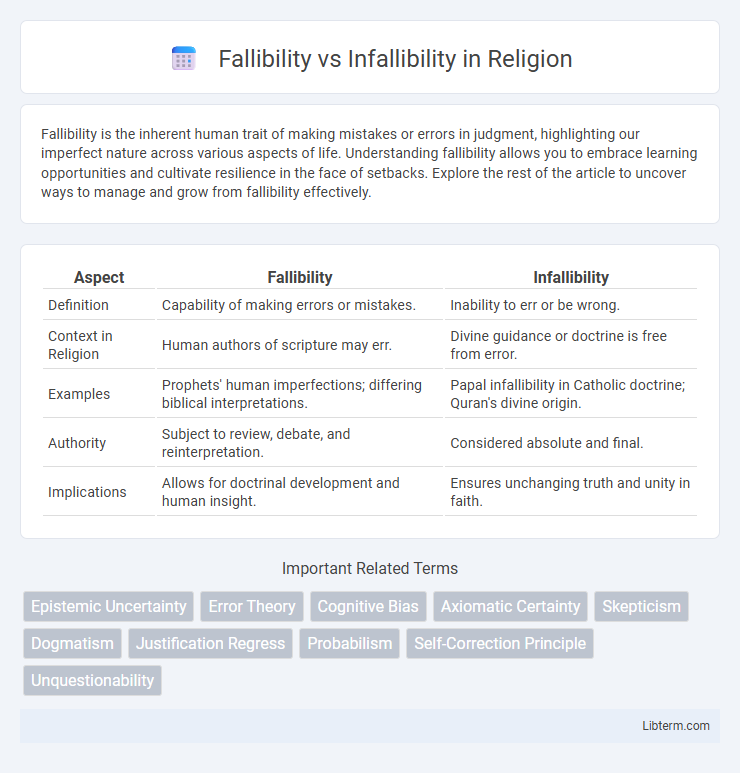Fallibility is the inherent human trait of making mistakes or errors in judgment, highlighting our imperfect nature across various aspects of life. Understanding fallibility allows you to embrace learning opportunities and cultivate resilience in the face of setbacks. Explore the rest of the article to uncover ways to manage and grow from fallibility effectively.
Table of Comparison
| Aspect | Fallibility | Infallibility |
|---|---|---|
| Definition | Capability of making errors or mistakes. | Inability to err or be wrong. |
| Context in Religion | Human authors of scripture may err. | Divine guidance or doctrine is free from error. |
| Examples | Prophets' human imperfections; differing biblical interpretations. | Papal infallibility in Catholic doctrine; Quran's divine origin. |
| Authority | Subject to review, debate, and reinterpretation. | Considered absolute and final. |
| Implications | Allows for doctrinal development and human insight. | Ensures unchanging truth and unity in faith. |
Understanding Fallibility and Infallibility
Fallibility refers to the inherent capacity of humans to make errors or mistakes, highlighting the importance of humility and critical thinking in decision-making processes. Infallibility denotes an absolute inability to err, often attributed to divine or authoritative figures, ensuring unquestionable trustworthiness and reliability. Understanding fallibility and infallibility enhances awareness of human limitations and the boundaries of certainty in knowledge and judgments.
Historical Perspectives on Human Error
Historical perspectives on human error reveal that fallibility has been widely acknowledged across various cultures and eras, with ancient texts and philosophical traditions recognizing the inevitability of mistakes in human judgment. Medieval scholars often debated the limits of human knowledge, contrasting fallibility with the divine concept of infallibility embodied in religious doctrine. Scientific advancements during the Enlightenment further emphasized empirical evidence and the corrigibility of human error, shaping modern understandings that distinguish human fallibility from the theoretical infallibility ascribed to certain institutional or doctrinal authorities.
Psychological Roots of Fallibility
Fallibility in human cognition originates from inherent psychological limitations such as biases, memory distortions, and perceptual errors, which affect decision-making processes. Cognitive heuristics, while useful for quick judgments, often lead to systematic mistakes that reveal the mind's vulnerability to error. Understanding these psychological roots is essential for developing strategies to mitigate fallibility and improve critical thinking accuracy.
The Myth of Infallibility in Leadership
The myth of infallibility in leadership creates unrealistic expectations that leaders must always make perfect decisions, ignoring human fallibility and the complexity of real-world challenges. Embracing fallibility allows leaders to acknowledge mistakes, foster transparency, and cultivate trust within their teams, ultimately enhancing organizational resilience. Research shows leaders who admit errors are often more respected and effective, as this openness encourages learning and innovation.
How Fallibility Shapes Decision-Making
Fallibility, the inherent possibility of making errors, profoundly influences decision-making by encouraging critical thinking and the continuous evaluation of evidence. Awareness of human limitations fosters adaptive strategies, such as contingency planning and feedback incorporation, to mitigate risks and improve outcomes. In contrast to infallibility, recognizing fallibility drives innovation and resilience through iterative learning and corrective actions.
Infallibility in Religion and Philosophy
Infallibility in religion often denotes the belief that certain sacred texts, leaders, or doctrines are incapable of error, ensuring divine truth and moral authority. Philosophically, infallibility addresses the concept of absolute certainty in knowledge, where some beliefs or propositions are immune to doubt or falsehood. The interplay between religious infallibility and philosophical inquiry challenges the boundaries of human cognition and divine revelation.
Cognitive Biases and Human Fallibility
Human fallibility is deeply intertwined with cognitive biases, which systematically distort perception, memory, and reasoning, leading to errors despite intentions for accuracy. Cognitive biases such as confirmation bias, anchoring, and availability heuristic demonstrate that even well-informed individuals can make flawed judgments due to inherent mental shortcuts. Understanding these biases is critical in distinguishing fallibility from infallibility, emphasizing that absolute correctness remains unattainable in human cognition.
Embracing Mistakes: Benefits of Acknowledging Fallibility
Acknowledging fallibility fosters personal growth and innovation by encouraging learning from mistakes and refining problem-solving skills. Embracing mistakes cultivates resilience and adaptability, essential traits for success in dynamic environments. Organizations that promote transparency about errors experience improved collaboration and trust, driving continuous improvement and creativity.
Societal Impacts of Infallible Mindsets
Infallible mindsets within societies often lead to stagnation by suppressing dissent and discouraging critical thinking, which undermines innovation and adaptive problem-solving. The belief in absolute certainty can foster authoritarianism and social polarization, as opposing viewpoints are dismissed as inherently wrong. Cultures embracing fallibility tend to promote resilience and collaborative progress by encouraging open dialogue and continuous learning.
Towards a Balanced View: Lessons from Fallibility and Infallibility
Fallibility acknowledges the inevitability of errors in human judgment, emphasizing the importance of ongoing learning and adaptation, while infallibility represents the ideal of absolute correctness, often unattainable in practice. A balanced view integrates these perspectives by fostering humility and critical thinking, encouraging individuals and institutions to strive for accuracy without dismissing the potential for mistakes. Lessons from both concepts highlight the value of resilience and openness to correction as key drivers of intellectual and practical growth.
Fallibility Infographic

 libterm.com
libterm.com